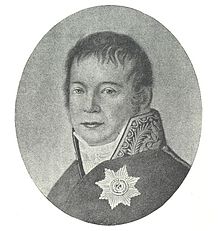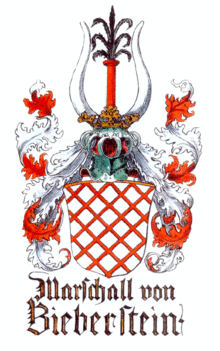Ernst Franz Ludwig Marshal von Bieberstein
Ernst Franz Ludwig Freiherr Marschall von Bieberstein (born August 2, 1770 in Wallerstein , † January 22, 1834 in Wiesbaden ) was the leading politician of the Duchy of Nassau as sole Minister of State from 1809 . He initially pursued a liberal reform policy, before he steered a course in restoration from 1818 until his death .
origin
Ernst Franz Ludwig Freiherr Marschall von Bieberstein was a family member of the old Meißnian noble family Marschall von Bieberstein . His parents were the Württemberg colonel and later Oettingen-Wallerstein court marshal Conrad Otto Christoph Freiherr Marschall von Bieberstein (1726–1796) and his wife Johanna Theresia Henriette nee. von Wolf (1738–1783).
Life
From 1782 Bieberstein attended the Karlsschule in Stuttgart . There he not only completed military training, but also attended the institute's philosophical and legal courses. There he had close contact with the later natural scientist Georges Baron de Cuvier . At a young age he was close to the ideas of the French Revolution . His older brothers Friedrich August Marschall von Bieberstein and Karl Wilhelm Marschall von Bieberstein were also graduates of the Karlsschule.
Promotion in the Nassau civil service
In 1791 he entered the military service as a lieutenant in the district contingent with Prince Wilhelm von Nassau-Usingen . Just one year later, he moved to the administration service in Nassau-Usingen. Marshal von Bieberstein was appointed court judge and government assessor. Relatively soon, in 1793, he traveled to The Hague as a diplomat , but was taken prisoner by French troops. As a result, he rose further in Nassau services. He became a councilor in 1793 and a member of the secret council in 1795. In 1796 he was appointed a secret councilor. Given the French superiority, he advocated some rapprochement with France. As early as 1793, like the Prussian reformers a few years later, he expressed the opinion that a constitution was the best protection against revolutionary movements and warned of excessive feudal burdens on the population in order to avoid revolutionary resistance. However, his understanding of the constitution was aimed at an authoritarian corporate state and by no means a liberal order. Against the will of the then District President Karl Friedrich Freiherr von Kruse , Marschall von Bieberstein traveled to Paris in 1797, not least in order to promote a policy of mediation there.
Territorial policy
In 1803 he was appointed regional president. One of the central tasks of the first few years was the negotiations on compensation for the areas on the left bank of the Rhine that fell to France. His goal was to create a closed territory on the right bank of the Rhine, which he pursued in close cooperation with his Nassau-Weilburg counterpart, Hans Christoph Ernst von Gagern . In the course of the beginning mediatization of the imperial knighthoods as a result of the imperial deputation main conclusion , he had, among other things, the possessions of imperial baron Heinrich Friedrich Karl vom Stein (the rule of Stein zu Nassau ) occupied by Nassau soldiers. Von Stein protested this emphatically, and under pressure from Emperor Franz II , the occupation had to be lifted first. This episode led to a long-lasting opposition from Steins to Nassau and Marschall von Bieberstein.
After the unification of the two Nassau-Usingen and Nassau-Weilburg states in 1806, both of which belonged to the newly founded Rhine Confederation , Bieberstein and Gagern became Minister of State and thus head of politics in the Duchy of Nassau. While Gagern was mainly responsible for foreign policy, Bieberstein was responsible for domestic policy issues. After Gagern's resignation, in 1809 Bieberstein became the sole minister of state and thus head of the government.
Reform policy
The first few years were characterized by a comprehensive domestic reform policy aimed at creating a unified state. In 1808 he campaigned for an end to serfdom . A year later, the tax privileges of the nobility were abolished. In addition, the right to marry Lutherans, Catholics and Reformed people was introduced. There was also a reorganization of the administration and some time later the introduction of the simultaneous school . A state health service was created in 1818. He was also involved in reforms in the judiciary and in economic and financial policy. These included the introduction of free trade in 1815 and freedom of trade in 1819 . In doing so, he followed the principles of economic liberalism .
In the years that followed, he took up Stein's proposal for a Nassau constitution. Together with vom Stein and Carl Friedrich Emil von Ibell , Bieberstein played a key role in its elaboration. The constitution came into force in 1814 and guaranteed fundamental rights . A state assembly consisted of the Herrenbank for the nobility and a Chamber of Deputies for the Church and the wealthy bourgeoisie.
Through this cooperation, the relationship with Freiherr vom Stein improved significantly. This had a positive effect on Nassau's position at the Congress of Vienna . Bieberstein was present there as a representative of his country. There he succeeded in maintaining Nassau's sovereignty against the initial intentions of annexing Prussia . As a thank you, Bieberstein received land and the moated castle in Hahnstätten .
In 1816 there was another conflict with vom Stein, who was living in Nassau again at that time. The latter did not want to accept the loss of his former position directly under the Empire and also attacked Bieberstein sharply in the press.
Restoration policy
Marshal von Bieberstein turned away from his previous reform course in 1818. The opposition in the country contributed to this, but also the restoration policy in the German Confederation that was initiated with the Carlsbad resolutions . Since then he has essentially followed Metternich's policy . Marshal von Bieberstein became head of an authoritarian regime. Politically, he was also able to survive the domain dispute in the 1830s.
He saw the preservation of the national sovereignty of Nassau as a central task. He supported Metternich in his policy of suppressing the national movement. With a view to preserving independence, Marshal von Bieberstein also rejected the development of the German Customs Union, which Prussia was promoting. To hinder this development, he signed a trade agreement with France in 1833. Only after the death of Marshal von Bieberstein was the rejection of the customs union lifted. The authoritarian regime he created survived until 1848.
In German historiography, the image was for a long time only shaped by the fight against the Zollverein and the reactionary domestic policy that began in 1819. The Rhenish Bund reform activities and the merits in building modern Nassau, on the other hand, did not receive due attention, probably also because the Duchy of Nassau, annexed by Prussia in 1866, only existed for six decades.
family
In 1802 he married Karoline von Veltheim (1783-1840), the daughter of the secret legation councilor Johann Friedrich von Veltheim. The marriage had four sons and seven daughters, including:
- Ernst August Friedrich Hans (1816–1860), domain councilor and member of the state parliament
- Friedrich Wilhelm (1806–1865), domain councilor and member of the state parliament.
- Charlotte Friederike (born January 12, 1810 - † December 8, 1832) ⚭ 1829 Emil August von Dungern (1802–1862)
- Dorothea Natalie (born June 21, 1808; † April 2, 1888) ⚭ 1834 Emil August von Dungern (1802–1862)
- Adolfine (* 1803) ⚭ 1828 Heinrich Friedrich Carl von Rettberg († 1844), Duke Colonel of Nassau and adjutant
- Luise Caroline (1804–1884) ⚭ 1827 Freiherr Friedrich Gerhard von Wintzingerode (1799–1870), Royal Prussian District President
- Auguste Therese (1805–1883) ⚭ 1830 Baron Friedrich Ernst Ludwig Heinrich von und zu Gilsa (1799–1859), Duke of Nassau Chamberlain and Chief Hunting Officer
- Marie Luise (1819–1904) ⚭ 1846 Baron Adolf Ludwig Marschall von Bieberstein (1806–1891), Chamberlain of Baden and Real Privy Councilor
Others
In honor of Marshal von Bieberstein, a burial chapel was built immediately after his death in the Hahnstätter cemetery, with the participation of the population, the so-called "Bieberstein'sche" or "Marschall's crypt". His wife Caroline and all descendants of the couple were buried there.
literature
- Hans-Werner Hahn: Bieberstein, Ernst Franz Ludwig Marschall von. In: New German Biography (NDB). Volume 16, Duncker & Humblot, Berlin 1990, ISBN 3-428-00197-4 , pp. 254-256 ( digitized version ).
- Wolf-Heino Struck : The pursuit of civil liberty and national unity from the point of view of the Duchy of Nassau . In: Nassauische Annalen , 77th Volume, 1966. pp. 142-216.
Web links
- Carsten Schermuly: The Hahnstätter Wasserschlößchen and its owners (Part I) ( Memento from September 24, 2004 in the Internet Archive )
- Marshal von Bieberstein, Ernst Franz Ludwig. Hessian biography. (As of February 18, 2020). In: Landesgeschichtliches Informationssystem Hessen (LAGIS).
Individual evidence
- ^ German biography: Marschall von Bieberstein, Ernst - German biography. In: www.deutsche-biographie.de. Retrieved December 11, 2016 .
- ^ State and learned newspaper of the Hamburg impartial correspondent , June 7, 1828, wedding announcement
| personal data | |
|---|---|
| SURNAME | Marshal von Bieberstein, Ernst Franz Ludwig |
| ALTERNATIVE NAMES | Marshal von Bieberstein, Ernst Franz Ludwig Freiherr |
| BRIEF DESCRIPTION | Minister of State of the Duchy of Nassau |
| DATE OF BIRTH | August 2, 1770 |
| PLACE OF BIRTH | Wallerstein |
| DATE OF DEATH | January 22, 1834 |
| Place of death | Wiesbaden |




